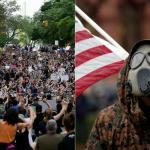Racism Is A Deadly Virus, Too: A Public Health Defense Of These Mass Protests

The horrific murder of George Floyd, who suffered nearly nine agonizing minutes of crushing weight on his neck and body while handcuffed on the ground, on the heels of the vigilante killing of Ahmaud Arbery and the police killing of Breonna Taylor, asleep in her bed, has sent thousands of protesters of all race and ethnicities into the streets across the U.S. As peaceful protest and civic unrest engulf the nation, the rallying cry is for a more just world where all are assured not only safety and their basic human rights but the resources needed for a decent life.
But some commentators, inside and outside of public health, are questioning the wisdom of these anti-racist protests, concerned they will increase the spread of COVID-19 and worsen existing racial, ethnic and economic inequities in COVID-19 deaths. Some even compare these risks to those posed by the anti-lockdown protests against COVID-19 regulations.
As public health professionals with expertise in infectious disease epidemiology, social epidemiology and public health and clinical practice, we categorically reject these false equivalencies.
The anti-lockdown protests, in their quest to open up the economy rapidly, have sought to minimize regulation of workplaces, social venues and personal health practices, like wearing masks. For example, the website for the April 17, 2020 protest at the Idaho capitol in Boise stated: “We feel that wearing face masks and gloves is counterproductive to the movement, and should be avoided” and asserted “We will not practice social distancing.” The Facebook page for a demonstration at the Massachusetts State House in Boston included a cartoon titled: “Episode 160 of `They Never Said That’,” featuring U.S. WWII troops, with the cartoon bubble saying, “We are fighting to ensure that future Americans can be forced to wear masks.” Photos taken at these protests show most of the protesters congregated closely, with nary a mask in sight.
The calls for protests against police brutality and for black lives offer a sharp contrast. In Boston, the flyer for one of the protests urged people to: “participate safely and observing as much as possible social distancing and personal and collective safety. Protect each other!” Photos of this massive protest show the vast majority of protesters — people of color and white participants alike — wearing masks, bolstered by Boston city workers handing out masks.
The call for another demonstration asks people to “gather while remaining socially distant to rally our Just Anger and mourn these homicides” and its instructions states: “We will remain socially distant at 6 feet apart,” “Please bring a mask, hand sanitizer & gloves.” The announcementof another protest states: “All participants must wear masks and must socially distance by standing at least 6 feet from the next person”
These differences matter. So does the fact that now, protesters are taking to the street because racism kills.
The data are clear: Structural racism underlies both lethal policing and the fact that black people have for centuries lived shorter, sicker lives — and are now over three times more likely to die of COVID-19 — compared to white Americans. As just one illustration, consider the inadequate provision of personal protective equipment for so-called “essential” workers, whose status as indispensable is belied by employers’ failure to ensure safe working conditions.
Other examples abound, involving inequities in testing, health care, places to self-isolate, and protection of people in jails and prisons, along with policies that have disproportionately cast people of color and low-income workers out of work.
Protesters are in the streets demonstrating against police brutality and white supremacy not because they are indifferent to the risk of COVID-19. They are doing what they can to protect themselves and their communities precisely because the institutions that are supposed to protect and serve them have been killing black people in this country far longer than the coronavirus has.
Krieger, Buckee and Bassett are professors at the Harvard T.H. Chan School of Public Health; Bassett is former commissioner of the New York City Department of Health and Mental Hygiene.
